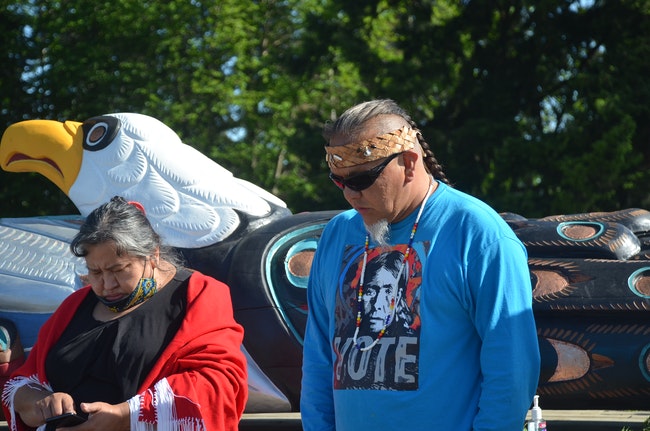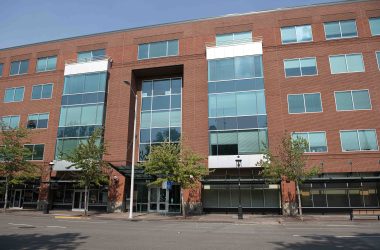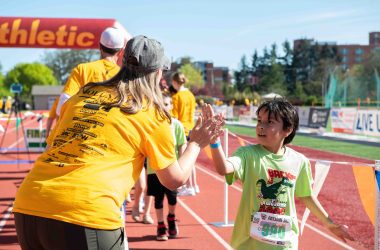 Freddie Lane, right, a citizen of the Lummi Nation and tour manager for the Red Road to DC journey, bows his head in prayer during a ceremony paying respects to children buried at Chemawa Cemetery on Friday, May 14, 2021 (Rachel Alexander/Salem Reporter)
Freddie Lane, right, a citizen of the Lummi Nation and tour manager for the Red Road to DC journey, bows his head in prayer during a ceremony paying respects to children buried at Chemawa Cemetery on Friday, May 14, 2021 (Rachel Alexander/Salem Reporter)
The markers at Chemawa Cemetery in north Salem tell a grim story of past epidemics.
Rows of graves for children who died at the Chemawa Indian School coincide with the 1918 flu pandemic and smaller outbreaks of disease in the school’s dormitories, which held hundreds of indigenous children sent to the federally run boarding school to separate them from their cultures.
On Friday, the House of Tears carvers from the Lummi Nation in northwestern Washington gathered outside the cemetery gates with a 24-foot totem pole carved earlier this year, paying their respects to the children buried at Chemawa, some in unmarked graves.
“We need accountability. We need to know every child in every cemetery,” said Jewell Praying Wolf James, a master carver who crafted the pole from a 400-year-old Western red cedar.
It’s an early stop on a cross-country journey the carvers are undertaking to visit tribal sites across the country and call attention to sacred lands and waters threatened by mining, drilling or dams. Their journey will end by delivering the totem pole to the Biden-Harris administration in Washington D.C. It will be displayed at the Smithsonian.
Many of the carvers and those who gathered for the ceremony had family ties to Chemewa, which operates today as a residential school for high school students who are members of federally recognized Indian tribes.
Freddie Lane, who’s organizing the tour, credits his years at Chemawa for “giving him a voice” and helping connect him to other indigenous students from around the western U.S.
“It’s called our home away from home,” said Lane, who graduated in 1986.
But he said the train tracks that run by the cemetery today serve as a grim reminder of “our American Holocaust,” the genocide of indigenous people and cultures.
 Jewell James, a master carver with the Lummi Nation’s House of Tears Carvers, sings at the start of a ceremony paying respects to children buried at Chemawa Cemetery on Friday, May 14, 2021 (Rachel Alexander/Salem Reporter)
Jewell James, a master carver with the Lummi Nation’s House of Tears Carvers, sings at the start of a ceremony paying respects to children buried at Chemawa Cemetery on Friday, May 14, 2021 (Rachel Alexander/Salem Reporter)
For the carvers, sharing their art, songs and prayers with people from other tribal nations is a source of strength. It shows that the federal government’s efforts to wipe out their cultures didn’t succeed.
“Our grandparents, our great-grandparents on both sides hid in the woods to sing their songs quietly,” James said.
The House of Tears carvers have traversed the U.S. with totem poles 19 other times, starting with a pole to promote healing after September 11th and memorialize those lost in the attacks.
“Every one of these poles were gifts to help lift up the spirit of the people,” said Sit-ki-kadem James, a carver, and Jewell’s brother.
 A 24-foot totem pole crafted by the Lummi Nation’s House of Tears Carvers stops at Chemawa Cemetery on Friday, May 14, 2021. The pole will travel across the U.S. as part of a tour to draw attention to sacred land and waters under threat (Rachel Alexander/Salem Reporter)
A 24-foot totem pole crafted by the Lummi Nation’s House of Tears Carvers stops at Chemawa Cemetery on Friday, May 14, 2021. The pole will travel across the U.S. as part of a tour to draw attention to sacred land and waters under threat (Rachel Alexander/Salem Reporter)
This totem pole is topped with a moon covered in red handprints to symbolize missing and murdered indigenous women, Jewelll James said. Below it sits an eagle, nose pointed down, symbolizing leadership, and a salmon, recognizing all salmon indigenous to rivers across the continent.
The carvers are currently touring the Northwest and visited Celilo Falls before coming to Salem. Their national journey, the Red Road to DC, officially begins in July with a stop at the lower Snake River dams.
Siam’elwit, a finisher who paints poles after carvers have done their work, teaches at the Lummi Nation’s school. Her mother, who attended Chemawa in the 1940s, died when she was a child, so Siam’elwit never heard her stories of Chemawa first hand. But Siam’elwit said she was told her mother tried to escape the school and return to her Nooksack home in northwest Washington, climbing into a truck with other fleeing students.
Now, Siam’elwit said younger Lummi citizens are teaching their native language, and the students she works with want to be in school learning about their culture.
“They don’t have the trauma that their predecessors had before,” she said. “To me, it shows hope.”
Contact reporter Rachel Alexander: [email protected] or 503-575-1241.
JUST THE FACTS, FOR SALEM – We report on your community with care and depth, fairness and accuracy. Get local news that matters to you. Subscribe to Salem Reporter starting at $5 a month. Click I want to subscribe!

Rachel Alexander is Salem Reporter’s managing editor. She joined Salem Reporter when it was founded in 2018 and covers city news, education, nonprofits and a little bit of everything else. She’s been a journalist in Oregon and Washington for a decade. Outside of work, she’s a skater and board member with Salem’s Cherry City Roller Derby and can often be found with her nose buried in a book.









